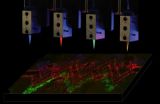(Press-News.org) Electronics are getting smaller all the time, but there's a limit to how tiny they can get with today's materials. Researchers now say, however, that they have developed a way to shrink capacitors — key components that store energy — even further, which could accelerate the development of more compact, high-performance next-gen devices. The study appears in the journal ACS Nano.
Takayoshi Sasaki and colleagues point out that many recent improvements have already downsized capacitors significantly. But current technology has almost reached its limit in terms of materials and processing, which in turn limits the performance that manufacturers can achieve. In response, researchers have gone to the nanoscale, but "nanocapacitors" are not easy to make.
They require harsh, difficult-to-use methods and even then, they may not work that well. So Sasaki's team developed an easier approach, and they use it to make high-performance "ultrathin" capacitors.
The researchers found that they could use gentle techniques and mild conditions to create a sandwich consisting of layers of two different types of oxide nanosheets to produce an ultrathin capacitor. In addition, the new capacitor has a capacitance density about 2,000 times higher than that of commercially available products. They say that, in the future, the ultrathin capacitors could be used in printed circuit boards and in memory storage devices, for example.
INFORMATION:
The authors acknowledge funding from the Japan Science and Technology Agency and MEXT, Japan.
The American Chemical Society is a nonprofit organization chartered by the U.S. Congress. With more than 161,000 members, ACS is the world's largest scientific society and a global leader in providing access to chemistry-related research through its multiple databases, peer-reviewed journals and scientific conferences. Its main offices are in Washington, D.C., and Columbus, Ohio.
To automatically receive news releases from the American Chemical Society, contact newsroom@acs.org.
Follow us: Twitter | Facebook
Advance in energy storage could speed up development of next-gen electronics
2014-02-19
ELSE PRESS RELEASES FROM THIS DATE:
Genetics linked to children viewing high amounts of violent media
2014-02-19
Washington, DC (February 19 2014) – The lifelong debate of nature versus nurture continues—this time in what your children watch. A recent paper published in the Journal of Communication found that a specific variation of the serotonin-transporter gene was linked to children who engaged in increased viewing of violent TV and playing of violent video games.
Sanne Nikkelen, Helen Vossen, and Patti Valkenburg of the University of Amsterdam's School of Communication Research, in collaboration with researchers at the Erasmus University Medical Centre in Rotterdam, analyzed ...
Special air filter blocks small particles called UFPs from getting inside cars
2014-02-19
While taking in the scenery during long road trips, passengers also may be taking in potentially harmful ultrafine particles (UFPs) that come into the car through outdoor air vents. Closing the vents reduces UFPs, but causes exhaled carbon dioxide to build up. Now, scientists report in the ACS journal Environmental Science & Technology that installing a newly developed high-efficiency cabin air filter (HECA) could reduce UFP exposure by 93 percent and keep carbon dioxide levels low.
Yifang Zhu and Eon Lee explain that most modern cars come with cabin air filters, but ...
Kinetic battery chargers get a boost
2014-02-19
New technology to capture the kinetic energy of our everyday movements, such as walking, and to convert it into electrical energy has come a step closer thanks to research to be published in the International Journal Biomechatronics and Biomedical Robotics.
Researchers have for many years attempted to harvest energy from our everyday movements to allow us to trickle charge electronic devices while we are walking without the need for expensive and cumbersome gadgets such as solar panels or hand-cranked chargers. Lightweight devices are limited in the voltage that they ...
A*STAR scientists discover protein's role in human memory and learning functions
2014-02-19
1. Scientists at A*STAR's Institute of Molecular and Cell Biology (IMCB) have identified the precise role of the protein, SNX27, in the pathway leading to memory and learning impairment. The study broadens the understanding of the brain's memory function and could be used to explain defects in the cognitive development of those with Down's syndrome. The newly established knowledge could potentially facilitate exploration of strategies to improve memory and learning abilities in Down's syndrome.
2. Down's syndrome is a genetic condition characterized by the presence ...
Could metabolism play a role in epilepsy?
2014-02-19
VIDEO:
The Kuehner lab demonstrates their drug-screening technique in JoVE's peer-reviewed video format to aid other researchers in the field.
Click here for more information.
February 19—Researchers from the Franciscan University of Steubenville, Ohio are exploring a possible link between metabolic defects and seizures. They determined that diet could influence susceptibility to seizures, and they have identified a common diabetes drug that could be useful in treating disorders ...
An essential step toward printing living tissues
2014-02-19
BOSTON — A new bioprinting method developed at the Wyss Institute for Biologically Inspired Engineering at Harvard University and the Harvard School of Engineering and Applied Sciences (SEAS) creates intricately patterned 3D tissue constructs with multiple types of cells and tiny blood vessels. The work represents a major step toward a longstanding goal of tissue engineers: creating human tissue constructs realistic enough to test drug safety and effectiveness.
The method also represents an early but important step toward building fully functional replacements for injured ...
Antidepressant holds promise in treating Alzheimer's agitation
2014-02-19
Feb. 19, 2014 (Toronto) - An antidepressant medication has shown potential in treating symptoms of agitation that occur with Alzheimer's disease and in alleviating caregivers' stress, according to a multi-site U.S.- Canada study.
"Up to 90 per cent of people with dementia experience symptoms of agitation such as emotional distress, restlessness, aggression or irritability, which is upsetting for patients and places a huge burden on their caregivers," said Dr. Bruce G. Pollock, Vice President of Research at the Centre for Addiction and Mental Health (CAMH), who directed ...
'Beautiful but sad' music can help people feel better
2014-02-19
New research from psychologists at the universities of Kent and Limerick has found that music that is felt to be 'beautiful but sad' can help people feel better when they're feeling blue.
The research investigated the effects of what the researchers described as Self-Identified Sad Music (SISM) on people's moods, paying particular attention to their reasons for choosing a particular piece of music when they were experiencing sadness - and the effect it had on them.
The study identified a number of motives for sad people to select a particular piece of music they perceive ...
Stratification determines the fate of fish stocks in the Baltic Sea
2014-02-19
With its narrow connection to the North Sea, strong currents, a large number of river estuaries and a bottom profile marked by ridges, basins and troughs, the Baltic represents an inland sea with highly different water qualities. The fact that these morphological and hydrographic conditions can also influence the fate of fish stocks has now been shown by a team of fisheries biologists from GEOMAR Helmholtz Centre for Ocean Research Kiel and the National Institute of Aquatic Resources (DTU Aqua) at the Technical University of Denmark. For their publication in the international ...
Dreams, deja vu and delusions caused by faulty 'reality testing'
2014-02-19
New research from the University of Adelaide has delved into the reasons why some people are unable to break free of their delusions, despite overwhelming evidence explaining the delusion isn't real.
In a new paper published in the journal Frontiers in Psychology, University of Adelaide philosopher Professor Philip Gerrans says dreams and delusions have a common link – they are associated with faulty "reality testing" in the brain's higher order cognitive systems.
"Normally this 'reality testing' in the brain monitors a 'story telling' system which generates a narrative ...

